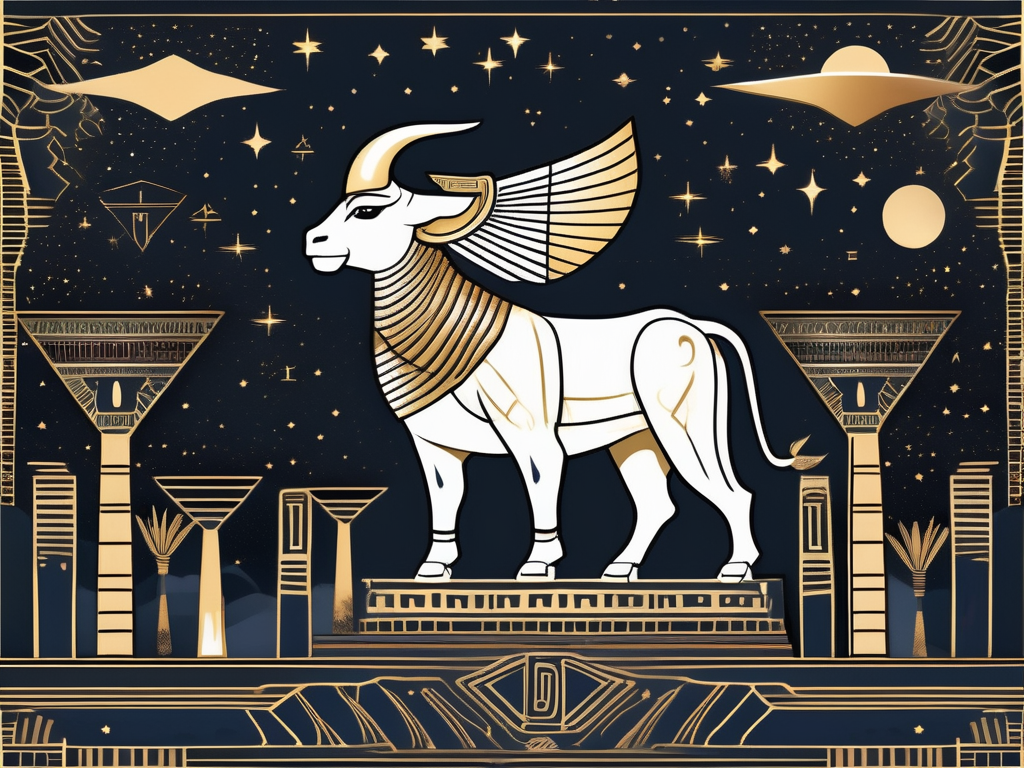The concept of UFOs, or Unidentified Flying Objects, has fascinated humanity for centuries. People have reported sightings of strange objects in the sky throughout history, and these phenomena have often been attributed to extraterrestrial beings or advanced technology. But what does the Bible have to say about UFOs? In this article, we will explore the biblical interpretations and theological perspectives surrounding this intriguing topic.
Understanding the Concept of UFOs
Before delving into the biblical references, it is important to first understand what UFOs are in a modern context. UFOs can refer to any unidentified object that appears to be flying in the sky, without a readily identifiable explanation. These objects can range from strange lights to disc-shaped crafts, leaving witnesses to speculate about their origin and purpose.
Defining UFOs in a Modern Context
When discussing UFOs, it is essential to separate fact from fiction. While some UFO sightings may indeed be unexplained phenomena, they do not necessarily indicate the presence of extraterrestrial life. It is vital to approach this topic with discernment and a willingness to explore various interpretations.
One intriguing aspect of modern UFO sightings is the wide range of reported shapes and sizes. Witnesses have described seeing triangular crafts, cigar-shaped objects, and even spherical orbs. These diverse accounts add to the mystery surrounding UFOs and make it challenging to pinpoint a definitive explanation.
Furthermore, the study of UFOs has led to the development of various theories. Some researchers propose that UFOs could be advanced military aircraft or experimental technology, while others suggest they might be interdimensional beings or time travelers. These theories, although speculative, contribute to the ongoing discourse surrounding UFOs.
Historical References to Unidentified Flying Objects
Interestingly, the idea of strange objects in the sky is not limited to modern times. Throughout history, there have been accounts of unusual aerial phenomena in various cultures worldwide. These historical references to unidentified flying objects raise questions about whether similar sightings occurred in biblical times.
For instance, ancient cave paintings depict peculiar flying objects that resemble modern-day UFOs. These prehistoric artworks, found in different parts of the world, suggest that humans have been observing and documenting unidentified aerial phenomena for thousands of years.
Moreover, ancient texts from different civilizations also contain descriptions of celestial events that defy conventional explanations. The Indian epic, Mahabharata, for example, mentions flying machines called Vimanas, which possessed extraordinary capabilities and were piloted by ancient gods. Similarly, the ancient Egyptians believed in the existence of celestial boats that transported their deities across the sky.
These historical accounts not only highlight the enduring fascination with unidentified flying objects but also raise intriguing questions about the nature of these phenomena. Could these ancient references be evidence of early encounters with advanced civilizations or extraterrestrial beings? Or do they simply reflect the imaginative interpretations of natural celestial events?
As we explore the concept of UFOs, it becomes clear that the subject is not limited to recent times but has a rich history intertwined with human civilization. The mystery surrounding unidentified flying objects continues to captivate our imagination and encourages us to seek answers to questions that have fascinated humanity for centuries.
Biblical Interpretations of Sky Phenomena
When examining the biblical texts, it becomes evident that various passages could be interpreted as references to sky phenomena. Some believers argue that these passages provide evidence of divine manifestations or interactions with extraterrestrial beings.
As we delve deeper into the rich tapestry of biblical interpretations, we uncover a multitude of fascinating details that shed light on the possible connections between the celestial and the divine.
Angels, Chariots and Clouds: Divine Manifestations
In the Bible, there are numerous instances of angels appearing to humans. These spiritual beings are often described as shining or radiant, resembling human-like figures. Some interpret these accounts as encounters with extraterrestrial beings who interact with humanity on behalf of God.
These celestial messengers, with their awe-inspiring presence, have captivated the imaginations of believers throughout history. Their appearances, often accompanied by a sense of wonder and reverence, have sparked debates and discussions about the nature of these encounters.
Furthermore, the mention of chariots and clouds in the biblical texts adds another layer of intrigue to the interpretation of these divine manifestations. Believers suggest that these metaphorical descriptions could be indicative of advanced technology or even alien spacecraft. Such interpretations seek to reconcile the existence of unidentified flying objects (UFOs) with the concept of divine intervention.
By exploring these possibilities, we open ourselves to a realm of wonder and speculation, where the boundaries between the earthly and the celestial blur, inviting us to contemplate the mysteries of the universe.
Visions and Dreams: Prophetic or Extraterrestrial?
Another aspect to consider is the significance of visions and dreams in the biblical narrative. Prophets, such as Ezekiel, Daniel, and John, experienced vivid visions that included descriptions of unusual creatures and flying objects. These prophetic encounters have fascinated scholars and believers alike, sparking a myriad of interpretations.
Some argue that these visions could be interpretations of extraterrestrial encounters or advanced technology beyond the comprehension of the time. These captivating accounts, filled with symbolism and mysticism, continue to ignite the imagination of those seeking to unravel the secrets hidden within the ancient texts.
As we delve into the depths of these visions, we find ourselves immersed in a world where the boundaries of reality and the supernatural intertwine. The intricate details and vivid imagery painted by the prophets invite us to contemplate the possibility of divine communication through extraordinary means.
By exploring the potential extraterrestrial connections to these visions, we embark on a journey that challenges our understanding of the universe and our place within it.
Theological Perspectives on Alien Life
While the existence of UFOs in the biblical narrative can be subject to interpretation, the theological implications of alien life are a matter of debate among theologians and believers worldwide.
The Limitless Creation: God and Alien Life
One theological perspective suggests that the vastness of God’s creation allows for the possibility of extraterrestrial life. The belief is that just as God created the Earth and all its creatures, He could have created life on other planets as well. This perspective holds that the existence of aliens does not pose a significant theological challenge.
Imagine the infinite expanse of the universe, with billions of galaxies, each containing billions of stars. Within this vast cosmic tapestry, Earth is but a tiny speck. The idea that God’s creative power is limited to just one planet seems narrow-minded and underestimates the boundless nature of the divine. If God is truly omnipotent, then the existence of life beyond Earth is not only possible but also probable.
Moreover, proponents of this perspective argue that the discovery of alien life would only deepen our understanding of God’s greatness. It would reveal the intricate and diverse ways in which God manifests life throughout the universe. Just as we marvel at the diversity of life on Earth, encountering extraterrestrial beings would expand our appreciation for the limitless creativity of the Creator.
Theological Debates on Extraterrestrial Existence
Conversely, some theologians argue that the Bible does not mention the creation of life on any other planet. They believe that humanity is unique and that the notion of extraterrestrial beings contradicts the biblical narrative. This perspective raises questions about the theological implications of discovering intelligent life beyond Earth.
According to this viewpoint, the Bible’s focus is primarily on humanity and its relationship with God. It does not explicitly address the existence of life beyond Earth. Therefore, proponents of this perspective argue that any claims of alien life should be approached with caution, as they may challenge the core tenets of religious faith.
These theologians also raise concerns about the potential impact of discovering intelligent extraterrestrial life on religious beliefs. They question how such a revelation would affect traditional understandings of God’s plan for humanity and the salvation narrative. Would the existence of alien civilizations undermine the uniqueness of human beings and our special place in God’s creation?
Furthermore, they argue that the absence of explicit biblical references to alien life suggests that God’s redemptive plan is focused solely on Earth. They contend that the incarnation of Jesus Christ and his sacrifice for humanity’s salvation may not extend to extraterrestrial beings, if they exist. This raises profound theological questions about the nature of God’s love and the scope of His redemptive work.
Ultimately, the theological debates surrounding alien life reflect the ongoing quest to reconcile scientific discoveries with religious beliefs. As our understanding of the universe expands, theologians and believers grapple with the implications of a potentially inhabited cosmos. Whether one embraces the idea of extraterrestrial life or remains skeptical, these discussions serve as a reminder of the ever-evolving nature of theological inquiry.
Biblical Passages That Could Refer to UFOs
When exploring the topic of UFOs from a biblical standpoint, several passages often come up for discussion. These verses present potential interpretations related to unidentified flying objects.
Ezekiel’s Wheel: A Biblical UFO?
In the Book of Ezekiel, there is a description of a mysterious wheel within a wheel, accompanied by vivid imagery of beings with the likeness of humans. Some interpret this passage as a biblical reference to a UFO sighting, where the wheel represents an extraterrestrial craft.
The passage in Ezekiel 1:16 states, “The appearance of the wheels and their workmanship was like sparkling beryl, and all four of them had the same form, their appearance and workmanship being as if one wheel were within another.” This description has led many to speculate that Ezekiel witnessed a UFO, as the wheel within a wheel is reminiscent of the structure of some reported unidentified flying objects.
Furthermore, the beings with the likeness of humans mentioned in the passage have been compared to the classic image of aliens commonly associated with UFO encounters. Their appearance, combined with the presence of the enigmatic wheels, adds fuel to the theory that Ezekiel may have had a close encounter with extraterrestrial life.
The Star of Bethlehem: Divine Sign or Alien Craft?
The story of the Star of Bethlehem, which guided the Magi to the birthplace of Jesus, has intrigued scholars for centuries. While some believe it was a miraculous astronomical event, others speculate that it could have been an alien spacecraft, drawing parallels between the star and UFO sightings.
The Gospel of Matthew describes the Star of Bethlehem as a guiding light that appeared in the sky, leading the Magi to the location of Jesus’ birth. This celestial phenomenon has been attributed to various astronomical events, such as a supernova or a conjunction of planets. However, some UFO enthusiasts propose an alternative explanation.
They argue that the Star of Bethlehem could have been an extraterrestrial craft, intentionally placed in the sky to guide the Magi. This interpretation suggests that the star was not a natural occurrence but rather a deliberate sign from advanced beings. Proponents of this theory point to the precision with which the star led the Magi to their destination, as well as the fact that it disappeared once they reached their destination.
While the debate between a divine sign and an alien craft continues, the story of the Star of Bethlehem remains a fascinating topic that intertwines religion, astronomy, and the possibility of extraterrestrial contact.
Reconciling Faith and the Possibility of Alien Life
The prospect of reconciling faith with the possibility of alien life can be challenging for believers. However, some theologians argue that science and religion are not mutually exclusive.
The Role of Science in Interpreting the Bible
Science offers valuable insights into the world and universe we inhabit. Many Christians believe that scientific discoveries can provide a deeper understanding of God’s creation, including the potential existence of alien life. They suggest that when interpreting the Bible, it is essential to consider scientific advancements and broaden our understanding accordingly.
Theological Implications of Discovering Alien Life
The discovery of intelligent extraterrestrial life could have profound theological implications. Believers would grapple with questions about the nature of salvation, the message of the gospel, and the uniqueness of humanity in God’s plan. Exploring these theological implications requires a willingness to adapt and consider new perspectives.
In conclusion, the Bible does not directly address UFOs or the existence of extraterrestrial life. However, believers interpret various passages as potential references to unidentified flying objects, divine manifestations, or encounters with extraterrestrial beings. The theological perspectives on alien life vary, ranging from acceptance to skepticism. Reconciling faith and the possibility of alien life requires an open-minded approach that integrates scientific discoveries, biblical interpretation, and theological reflection. Whether or not the Bible explicitly speaks about UFOs, the ongoing pursuit of knowledge and understanding is a fundamental aspect of faith.












